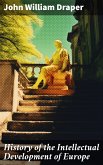In 'History of the Intellectual Development of Europe,' John William Draper presents a comprehensive exploration of the evolution of European thought from the Middle Ages to the 19th century. Employing a narrative style that combines rigorous analysis with philosophical inquiry, Draper delves into the interplay between science, religion, and philosophy, emphasizing how these fields shaped societal progress. His contextually rich account effectively illustrates the gradual emergence of rationalism and secularism in a period marked by tumultuous conflict and transformative discoveries. Draper's work is notable for its erudition and clarity, bridging the gap between the historical and the intellectual. John William Draper, a distinguished scientist and historian, was deeply influenced by the tumultuous changes of his era, including the rise of empirical science and the challenges posed by modern philosophy to religious orthodoxy. His multifaceted career spans medicine, chemistry, and photography, reflecting his belief in the unity of knowledge. Draper's engagement with contemporary debates on evolution, ethics, and spirituality informs his historical perspective, making his insights resonate with the intellectual currents of his time. This pivotal text is ideal for readers seeking an in-depth understanding of how intellectual developments have shaped modern Europe. Draper's interdisciplinary approach offers valuable insights, making it a vital resource for historians, philosophers, and anyone interested in the foundations of contemporary thought.
Dieser Download kann aus rechtlichen Gründen nur mit Rechnungsadresse in A, B, BG, CY, CZ, D, DK, EW, E, FIN, F, GR, H, IRL, I, LT, L, LR, M, NL, PL, P, R, S, SLO, SK ausgeliefert werden.









